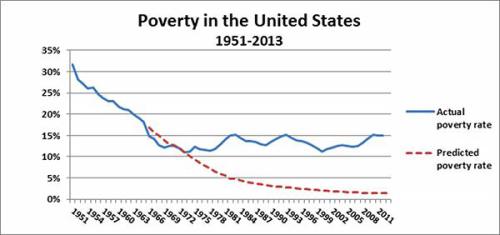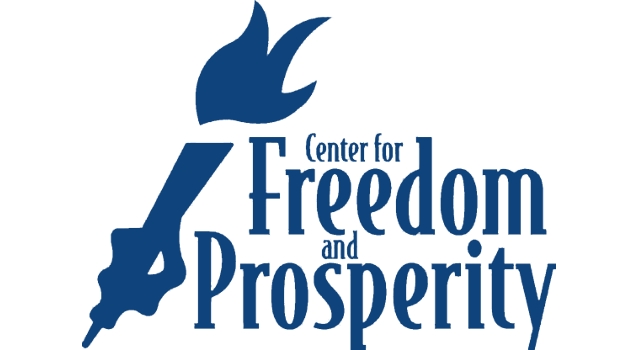On several occasions, I’ve observed that the poverty rate in America was steadily falling, but that progress came to a halt in the mid-1960s when the government declared a War on Poverty.
And I almost always included a chart showing the annual poverty rate over several decades.
Moreover, I posted graphs showing how government programs trap people in dependency because of very high implicit marginal tax rates. And that’s true in other nations as well.
But it didn’t matter how many times I revisited this issue, I was never clever enough to look at the poverty-rate data to estimate what would have happened if the federal government hadn’t become involved.
Fortunately, John Goodman of the National Center for Policy Analysis was insightful enough to fill the breach. He shows that the War on Poverty has made a big difference. But in the wrong way.

Here’s some of what John wrote about the topic in a column for Forbes.
From the end of World War II until 1964 the poverty rate in this country was cut in half. Further, 94% of the change in the poverty rate over this period can be explained by changes in per capita income alone. Economic growth is clearly the most effective antipoverty weapon ever devised by man. The dotted line shows what would have happened had this trend continued. Economic growth would have reduced the number in poverty to a mere 1.4% of the population today—a number so low that private charity could probably have taken care of any unmet needs. …we didn’t continue the trend. In 1965 we launched a War on Poverty. And as the graph shows, in the years that followed the portion of Americans living in poverty barely budged.
John augments this analysis by looking at some of the social science research about poverty and government dependency.
The numbers are very depressing.
…here is something you may not know. Early on ― in the first decade of our 50-year experiment with an expanded welfare state ― carefully controlled experiments funded by the federal government established without question that welfare changes behavior. It leads to the very behavioral changes that keep people in a state of poverty and dependency. …The experiments were all conducted by social scientists who believed in the welfare state and had no doubt about its capacity to be successful. …The experiments were all controlled. Randomly selected people were assigned to a “control group” and an “experimental group.” …the results were not pretty. To the dismay of the researchers, they largely confirmed what conventional wisdom had thought all along. …The number of hours worked dropped 9% for husbands and 20% for wives, relative to the control group. For young male adults it dropped 43% more. The length of unemployment increased 27% among husbands and 42% for wives, relative to the control group. For single female heads of households it increased 60% more. Divorce increased 36% more among whites and 42% more among blacks. (In a New Jersey experiment, the divorce rate was 84% higher among Hispanics.)
President Obama and other folks on the left don’t seem overly interested in this data.
Instead, they beat the drums about class warfare and income inequality.
They want us to believe the economy is a fixed pie and that all of us somehow get less if some entrepreneur becomes rich.
But John’s point from the column is correct.Economic growth is the way to help the poor, not redistribution.
Unfortunately, many politicians are hostile to thetypes of policies that produce more growth. Maybe it’s because they don’t understand economics. Or maybe they understand economics but don’t care because they think they’ll be more successful at the ballot box if they pursue the politics of envy and division.

